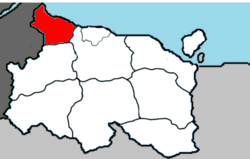Palno: Difference between revisions
No edit summary |
No edit summary |
||
| Line 49: | Line 49: | ||
When combined, "Palno" in Benthenses represents a state located near a border and implies a lack of certain characteristics or attributes typically found in neighboring regions. | When combined, "Palno" in Benthenses represents a state located near a border and implies a lack of certain characteristics or attributes typically found in neighboring regions. | ||
==History== | |||
On August 12th, 1709, Palno, a state located in northwest Bentho, was founded, marking a significant chapter in its early history. The region was initially inhabited by indigenous tribes, but it was during the colonial era that the area began to experience Benthenses influence and settlement. | |||
The first Benthenses settlers arrived in the region, led by the intrepid explorer João da Silva, seeking new opportunities and fertile land. A group of settlers established a small agricultural settlement near the present-day location of Lazana, the state's capital. | |||
The settlement, known as [[Nova Esperança]], quickly grew as more Benthenses immigrants from various backgrounds joined the community. The diverse cultural heritage of the settlers contributed to the vibrant and multicultural nature of the early Palno society. | |||
The settlers of Nova Esperança faced numerous challenges in their early years. They had to navigate the rugged terrain, establish infrastructure, and adapt to the local climate and indigenous customs. However, their resilience and determination allowed them to gradually transform the region into a thriving agricultural center, with crops such as sugarcane, coffee, and grains becoming key contributors to the local economy. | |||
As the settlement expanded and prospered, the name "Nova Esperança" was eventually changed to Palno, symbolizing the unity and progress of the Benthenses settlers. | |||
Over time, Palno continued to grow, attracting more settlers and becoming an important trading hub in the region. Its strategic location near the borders of Vulkaria, Aregoyape, and Chiquique facilitated trade and cultural exchange, further fueling its development and prosperity. | |||
The early history of Palno, shaped by the pioneering spirit of Benthenses settlers, laid the foundation for the state's growth and diversity. Today, Palno stands as a testament to their enduring legacy, with its vibrant culture, strong economy, and rich heritage reflecting the spirit of its early founders. | |||
Revision as of 18:53, 17 June 2023
Palno | |
|---|---|
 Palno located in Bentho | |
| Country | Bentho |
| Capital | Lazana |
| Largest city | Lazana |
| Government | |
| • Governor | Mel Salas (LOB) |
| Population | |
| • Total | 2,119,102 |
Palno, located in the northwest region of Bentho, is a state known for its vibrant capital and largest city, Lazana. Situated on the border of Vulkaria and neighboring the states of Aregoyape to the south and Chiquique to the east, Palno holds a strategic position in the country. With a population of 2,119,102, it boasts the highest population among the states of Bentho.
Due to its strategic location and favorable economic conditions, Palno serves as an important trading hub, facilitating commerce and fostering economic prosperity. The state's diverse economy includes industries such as manufacturing, agriculture, tourism, and services, contributing to its overall growth and stability.
Palno's scenic landscapes, including its picturesque coastal areas and natural reserves, attract tourists and nature enthusiasts. The state's cultural heritage is also celebrated through various festivals, showcasing its traditions, music, and cuisine.
With its dynamic capital city, strong governance, growing population, and diverse economy, Palno stands as a thriving state within Bentho, playing a significant role in the country's overall development and progress.
Etymology
The name "Palno" in Benthenses is formed from two elements:
"Pal" - This element is derived from the Benthenses word "pal," which means "border" or "boundary." It signifies the state's association with a border region.
"No" - This element is a Benthenses word meaning "not" or "without." It adds a sense of negation or absence to the name.
When combined, "Palno" in Benthenses represents a state located near a border and implies a lack of certain characteristics or attributes typically found in neighboring regions.
History
On August 12th, 1709, Palno, a state located in northwest Bentho, was founded, marking a significant chapter in its early history. The region was initially inhabited by indigenous tribes, but it was during the colonial era that the area began to experience Benthenses influence and settlement.
The first Benthenses settlers arrived in the region, led by the intrepid explorer João da Silva, seeking new opportunities and fertile land. A group of settlers established a small agricultural settlement near the present-day location of Lazana, the state's capital.
The settlement, known as Nova Esperança, quickly grew as more Benthenses immigrants from various backgrounds joined the community. The diverse cultural heritage of the settlers contributed to the vibrant and multicultural nature of the early Palno society.
The settlers of Nova Esperança faced numerous challenges in their early years. They had to navigate the rugged terrain, establish infrastructure, and adapt to the local climate and indigenous customs. However, their resilience and determination allowed them to gradually transform the region into a thriving agricultural center, with crops such as sugarcane, coffee, and grains becoming key contributors to the local economy.
As the settlement expanded and prospered, the name "Nova Esperança" was eventually changed to Palno, symbolizing the unity and progress of the Benthenses settlers.
Over time, Palno continued to grow, attracting more settlers and becoming an important trading hub in the region. Its strategic location near the borders of Vulkaria, Aregoyape, and Chiquique facilitated trade and cultural exchange, further fueling its development and prosperity.
The early history of Palno, shaped by the pioneering spirit of Benthenses settlers, laid the foundation for the state's growth and diversity. Today, Palno stands as a testament to their enduring legacy, with its vibrant culture, strong economy, and rich heritage reflecting the spirit of its early founders.